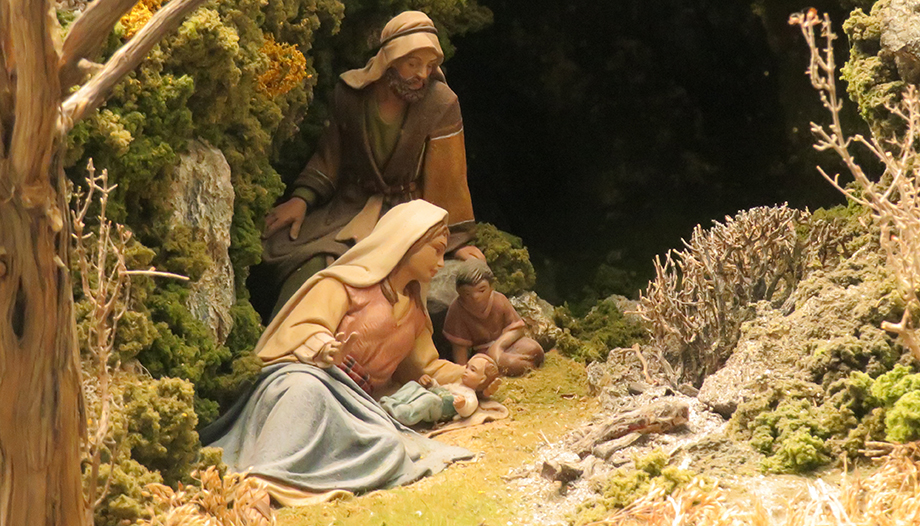Perhaps when reading this title, some readers have decided not to continue reading, because they will have thought something like "here they are, these environmentalists who are always here with their nonsense". I hope that this article will contribute something to those who have overcome this first impulse.
I agree with those more critical readers that the adjective "ecological" is applied with occasion and without occasion to things that cannot always really be considered part of what Pope Francis (and other previous pontiffs) call "integral ecology."
I also agree that the label is applied to things that not only cannot be considered very "natural," but are openly at odds with the ultimate nature of people and other created beings.
Here I am going to apply the term ecological to a holiday that has a deep religious meaning, Christmas, as natural as we celebrate the birth of a Child who took on our human nature and changed forever the way we understand it.
Since the Son of God became incarnate, human nature also became divine nature, hence the incarnation supposes - in the last analysis - the "deification" of matter, of which all living beings are made.
Although this is not the place to deal with it theologically in detail, it should be pointed out that the Incarnation of the Second Person of the Trinity has a profound ecological implication. Not only does it confirm what the first chapter of Genesis already indicates, that everything created by God is good, but also, in one way or another - and with what we now know about the evolution of matter - it assumes that Nature (created matter) is part of the human body of the incarnate God.
Christmas, in this sense, is the most ecological feast, because as a result of the birth of Christ, all material realities acquire a new dimension: for a Christian they are not only the image of God (all creatures reflect the Creator), but they also have a certain sacred character. To despise the material in any way is to fail to recognize the Incarnation, as did the docetists and Gnostics, historically the first heresies of Christianity.
In this regard we can recall some words of St. Josemaría: "The authentic Christian sense that professes the resurrection of all flesh has always, as is logical, confronted disincarnation, without fear of being judged as materialism. It is licit, therefore, to speak of a Christian materialism that boldly opposes materialisms closed to the spirit" (Conversations with Bishop Escrivá, 1968, no. 115). In short, the first environmental dimension of Christmas is to recognize that the human and divine person of Jesus gives a new meaning to our appreciation of Nature, of the environment that surrounds us, which from then on not only reflects in a much deeper way the image of the Creator, but also forms part of the body of the Redeemer.
The second "ecological" dimension of Christmas is of a more practical order. We know that superfluous consumption is the main cause of environmental degradation of the planet. Every thing we buy or eat, every trip we take, involves the use of a certain amount of resources and energy. Of course we need to consume, whatever is reasonable for our needs, but consuming because "it touches", without stopping to consider the utility or convenience of what we are going to buy, does not make much sense, neither environmentally nor Christianly.
Let us remember that poverty is a key virtue in Christianity, and that poverty is not not not having, but not wanting to have when we can have. We celebrate the birth of Jesus, who freely chose to do so in a stable, showing that happiness does not depend on material well-being. It seems reasonable to rejoice in his birth, but the celebration need not be centered on unbridled consumption.
These days, everyone suddenly discovers something "must-have" to buy, something that will undoubtedly make their life much happier, that will allow them to improve on almost every front of their humdrum existence. That's how they sell it to us, and that's how we accept it. And then they blame it on the system (which it certainly is), as if we human beings were automatons or guided by a hidden destiny that forces us to buy with or without occasion.
Perhaps it is an exercise of Christian rebellion to refuse excessive consumption, to make the joy and festivity of these days compatible with frugality and simplicity of life.
Consumerism is basically a reflection of the spiritual emptiness in which so many people find themselves, as Pope Francis pointed out in Laudato Si: "The emptier a person's heart is, the more he or she needs objects to buy, possess and consume" (n. 204). We try to fill an inner longing with material goods that have no capacity to do so, that only bring us momentary joy. After all, we know that the happiness of shopping is short-lived.
I end with a part of the dialogue between the little prince and the fox who wanted to be his friend: "Men no longer have time to know anything. They buy everything ready-made in the stores. And since there are no stores where they sell friends, men no longer have friends" (Antoine De Saint-Exupéry, The Little Prince, 2003). If we meditate on this carefully, we will surely end up recognizing that the deepest part of our lives, what really makes us happy, cannot be bought with money.
Professor of Geography at the University of Alcalá.







